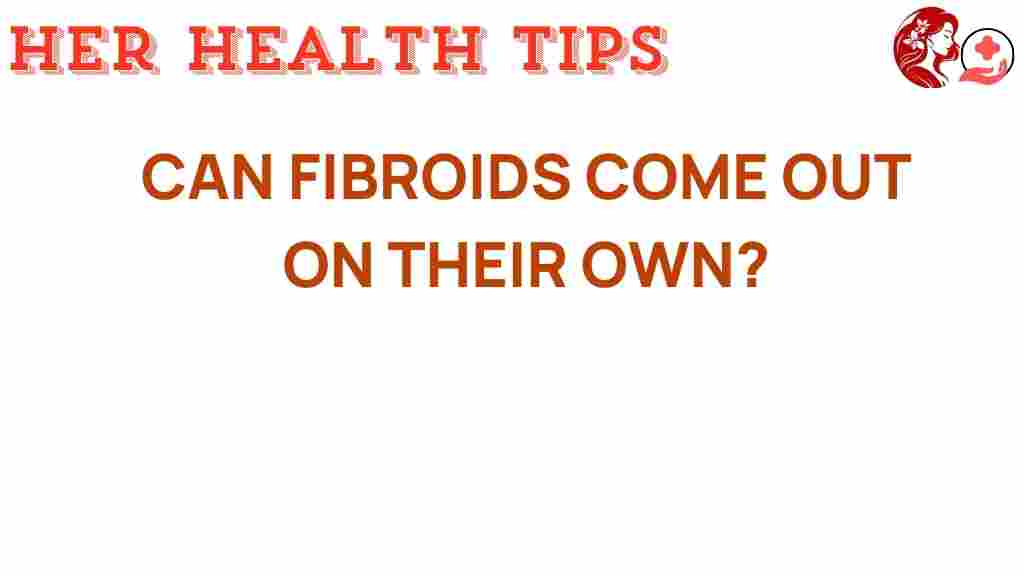Can Fibroids Naturally Disappear? Understanding the Myths and Facts
Fibroids are non-cancerous growths that develop in or on the uterus. They are quite common, affecting a significant number of women at some point in their lives. As awareness about women’s health continues to grow, so do the questions surrounding fibroids, particularly if they can naturally disappear. This article unpacks the myths and facts about fibroids, explores natural remedies, and provides insights into treatment options, focusing on holistic approaches that may aid in uterine health.
Understanding Fibroids
Before diving into whether fibroids can naturally disappear, it’s essential to understand what they are, their symptoms, and their impact on health. Fibroids, also known as uterine leiomyomas, can vary in size and number. They are classified into several types based on their location:
- Intramural Fibroids: These grow within the uterine wall.
- Subserosal Fibroids: These develop on the outer wall of the uterus.
- Submucosal Fibroids: These protrude into the uterine cavity.
- Pedunculated Fibroids: These are attached to the uterus by a stalk.
Symptoms of Fibroids
Many women with fibroids experience few or no symptoms, but when symptoms do occur, they can significantly impact quality of life. Common symptoms include:
- Heavy menstrual bleeding
- Abdominal pain or pressure
- Frequent urination
- Difficulty emptying the bladder
- Constipation
- Pain during intercourse
- Enlarged uterus or abdomen
Health Myths Surrounding Fibroids
There are many health myths related to fibroids that can lead to confusion. Here are some common misconceptions:
- Myth 1: Fibroids only occur in older women.
- Myth 2: All fibroids need to be treated.
- Myth 3: Fibroids will always turn cancerous.
- Myth 4: Pregnancy causes fibroids to grow.
It is crucial to debunk these myths to better understand how to manage fibroids and explore potential treatment options.
Can Fibroids Naturally Disappear?
The question of whether fibroids can naturally disappear has intrigued many women. Current medical insights suggest that while fibroids may shrink or change in size, they do not typically vanish completely without intervention. However, certain factors can influence their growth and development:
- Hormonal Changes: Fibroids are sensitive to estrogen and progesterone, hormones that fluctuate throughout a woman’s life, especially during menopause when estrogen levels drop.
- Age: Many fibroids may shrink after a woman reaches menopause due to decreased hormone levels.
- Pregnancy: Some studies indicate that fibroids may grow during pregnancy due to increased hormone levels, but they may also shrink postpartum.
Exploring Natural Remedies for Fibroids
While there is no guaranteed natural remedy to make fibroids disappear, some holistic approaches may help manage symptoms and promote uterine health. Here are some natural remedies that have been explored:
- Dietary Changes: A diet rich in fruits, vegetables, whole grains, and low in processed foods can support overall health. Specific nutrients such as vitamin D, iron, and antioxidants are beneficial for women’s health.
- Herbal Remedies: Some herbs, like milk thistle and green tea, may offer benefits due to their anti-inflammatory properties. Always consult a healthcare professional before starting any herbal treatment.
- Stress Management: High stress levels can exacerbate symptoms. Practices such as yoga, meditation, and deep breathing exercises can help alleviate stress.
- Regular Exercise: Physical activity can help maintain a healthy weight and balance hormones, which may positively influence fibroid growth.
Step-by-Step Guide to Managing Fibroids Naturally
Here’s a simple step-by-step process to potentially manage fibroids through natural remedies:
- Consult a Healthcare Professional: Before making any changes, discuss your symptoms and treatment options with a healthcare provider.
- Adopt a Healthy Diet: Focus on whole, nutrient-dense foods. Incorporate foods high in fiber and low in sugar.
- Incorporate Herbal Supplements: If considering herbal remedies, consult with a qualified herbalist or healthcare provider.
- Engage in Regular Physical Activity: Aim for at least 30 minutes of moderate exercise most days of the week.
- Practice Stress Reduction Techniques: Incorporate mindfulness, yoga, or meditation into your daily routine.
Troubleshooting Tips for Managing Symptoms
If you are experiencing symptoms related to fibroids, here are some troubleshooting tips:
- Keep a Symptoms Diary: Track your symptoms, menstrual cycle, and any dietary changes to identify potential triggers.
- Stay Hydrated: Drinking plenty of water can help reduce bloating and discomfort.
- Consider Nutritional Supplements: If you are deficient in iron or other vitamins, talk to your healthcare provider about appropriate supplements.
- Seek Support: Join support groups or forums for women dealing with fibroids to share experiences and coping strategies.
Treatment Options Beyond Natural Remedies
While natural remedies can be beneficial, some cases may require medical intervention. Here are some treatment options available:
- Medications: Hormonal therapies can help manage symptoms and reduce the size of fibroids.
- Minimally Invasive Procedures: Options like uterine artery embolization (UAE) can reduce blood flow to fibroids, causing them to shrink.
- Surgery: In severe cases, surgical options such as myomectomy or hysterectomy may be necessary.
It’s essential to weigh the benefits and risks of each treatment option in consultation with your healthcare provider.
Conclusion
In summary, while fibroids may not naturally disappear entirely, they can shrink and be managed through various natural and medical approaches. Understanding the facts surrounding fibroids, their symptoms, and the treatment options available can empower women to take control of their uterine health. Always consult with a healthcare professional before starting any new treatment or remedy.
For more information on women’s health and holistic approaches, check out this resource.
It’s vital to stay informed and advocate for your health. Remember, every woman’s experience with fibroids is unique, and what works for one person may not work for another. Take the time to explore your options and find the best path forward for your health and well-being.
This article is in the category Reproductive and created by HerHealthTips Team
